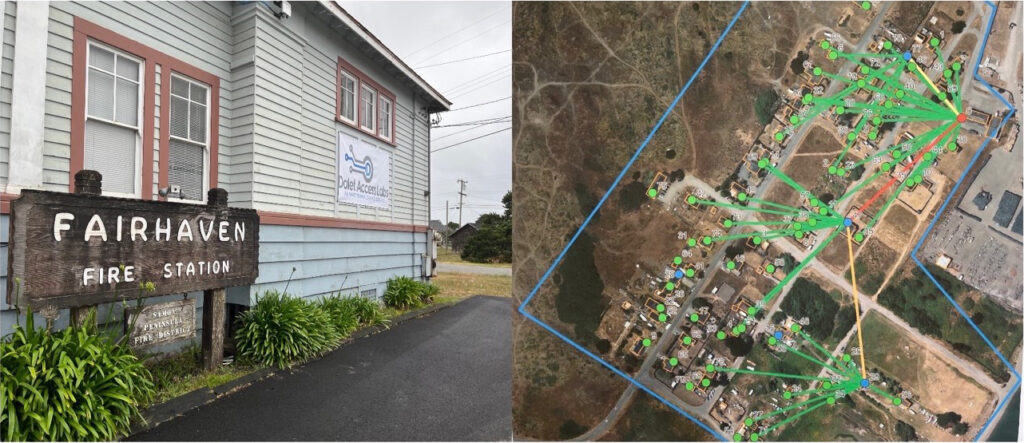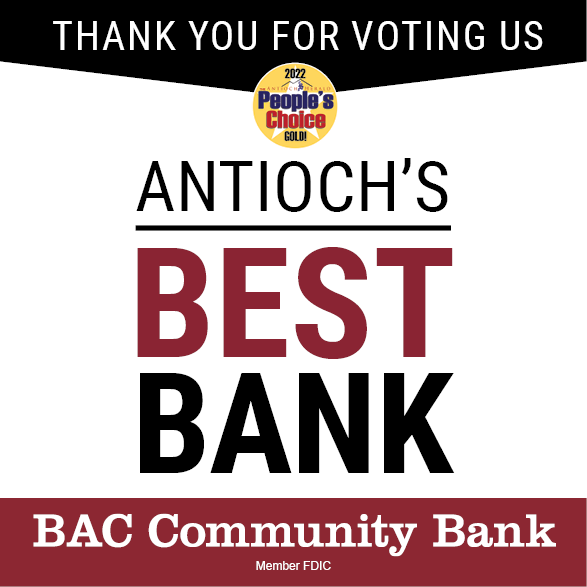Tech firm relocates to Antioch completes $1 million CA Digital Innovation Challenge global competition

Dalet Access Labs is going into the most underserved areas and building “infrastructure grid of the future” from the bottom up
By Allen D. Payton
A locally minority-owned tech firm in Antioch, CA was the only company to complete the requirements of the $1 Million Dollar State of California Innovation Challenge by deploying a system in Fairhaven, CA near Eureka in Humboldt County. State Superintendent of Public Instruction Tony Thurmond announced the global competition in early 2021, to award “up to $1 million to the boldest, most revolutionary proposals to eliminate the digital divide and expand high-speed internet access to all Californians.” After they entered the competition in August 2021, Dalet Access Labs was assigned that community by the California Department of Education (CDE) to deploy their innovative network fabric
The CDE estimates that nearly a half-million students still lack either a device to attend school online, network access to their classroom, or both.
The rules of the challenge stipulated that competitors had to test their innovation with students experiencing a lack of connectivity either due to barriers of affordability or infrastructure. The solution had to be at a cost of no more than $15/month per household, include 100 megabits synchronous upload and download speed with no data caps, and have fully deployable implementation within a year.
The competition was the result of a partnership with Genentech and the Genentech Foundation, General Motors and Dr. Gary K. Michelson, Founder and Co-Chair of Michelson Philanthropies and the Michelson 20MM Foundation – and Dalet Access Labs was in it to win it.
On July 1, of 2022 the company successfully deployed broadband connectivity services to the Fairhaven community with upload and download speeds that exceeded the competition requirements. It was tested with students who came to visit the site and learn as part of the Technology Exploration Summer Institute (TESI) program sponsored by Humboldt County Office of Education (HCOE).
In October of 2022, HCOE sponsored a ribbon cutting ceremony to showcase the success of the broadband deployment in the Fairhaven community by inviting the leadership from CDE and other government officials to come tour the site with hopes of a winner being declared at this event.

According to the October 6, 2022 CDE press release, they celebrated the launch of the new high-speed digital internet system in Fairhaven. The newly installed broadband network is a model in an effort to reduce rural California’s internet “digital divide,” and is a collaboration between the HCOE, the Samoa Peninsula Fire District in Samoa, CA and Dalet. The fire district’s Fairhaven fire station was chosen as the base of operations due to its proximity to all the homes in the community. “The Fairhaven model surpassed the minimum requirements for the Innovation Challenge by providing download speeds of around 100 megabits. Dalet Access Labs led the project with HCOE to create the broadband system under guidelines set forth in the CDE competition. The group worked with Cogent Communications and AT&T to launch a live fiber optic line to the Fairhaven firehouse structure and through the system’s optimized sensor-networking software, the system was enabled, providing low latency, and high-speed internet coverage to families in Fairhaven. The infrastructure for high-quality distance learning was in place as a result,” the press release reads.
Edehomon claims the actual speeds were around 700 megabits.
Although Dalet Access Labs is a small tech start-up, this is big news for them and the City of Antioch, as the opportunities for this technology are endless. According to their website, the company was “founded in 2019 and has become one of the world’s premier disruptive innovation partners that is praised by customers and vendors as we forge strategic partnerships and create new opportunities for our clients and vendors. We are known for getting stuff done. We pride ourselves on working efficiently, on time and within budget.”
“We were one of the four finalists for the high-speed broadband for the underserved,” CEO Odion “Odie” Edehomon shared. “COVID exposed the poor state of infrastructure in our country. The California Dept of Education invited companies to innovate. We were one of the 48 companies to participate. They narrowed it down to seven, then to four companies. We were the only company to deploy our intelligent network fabric.”
“We have the corporate office, here in Antioch. The lab is in Fairhaven,” he shared. Damon Owens, known in the community as the head pastor of Genesis Church on E. 18th Street is Vice President of Community Development.
Dalet spent over $700,000 to prove their solution would work. They were able to successfully deploy its innovative Network as a Service (NaaS) network platform that provides broadband connectivity services that met and exceeded all competition requirement, as was stated by the CDE representative, Chief Deputy Superintendent Mary Nicely, during the official ribbon cutting ceremony hosted by HCOE. Edehomon and Owens said they were told that Dalet was the only remaining participants who had completed the challenge, which gave them hope that they would be declared the winner of the competition and be awarded the $1 million prize.
“We knew from the beginning we were going to win,” Edehomon said with a laugh.
Asked how he said, “We are vendor-neutral. I’m from the dev-test industry. We are the equal system behind any technology development. Our knowledge of where infrastructure is going to be in 10 years, we knew we were going to build something that will transform.”
However, none of the competitors won, according to a recent San Francisco Chronicle article which reads, “a Chronicle investigation has found that state officials misled contestants about the contest, then proceeded to ignore their urgent emails and calls for months at a time. State officials said they and the prize’s funders, who later judged the competition, hoped someone, maybe at academic heavyweights like MIT or CalTech, was sitting on an invention that would provide universal, fast and very cheap internet access — within a year’s time.”
But the result was practical solutions from Edehomon’s work and a very pleased Humboldt County community.
The platform deployed by Dalet Access is a “Public Infrastructure Network Node (PINN) compliant network. This is a model that enables the full functionality of Fourth Industrial Revolution 4.0 technology of the future like, autonomous vehicles, robotics, and drone technology through the implementation of an intelligent grid platform,” he explained.
“It is the standard for an infrastructure grid of the future,” Edehomon said. “It is software driven. It’s a single platform, whether it’s 5G or 6G, satellite or fiber. Smart cities will be plugging into it, driverless cars and buses. B2B (business to business), car to car, ultrawide band. Smart Dot, Smart Pavement, Smart Vault.”
“Autonomy Institute is taking the lead on it. They’re based in Texas,” Edehomon continued. “We’re looking at things five to ten years ahead. We’re building this intelligent transformation platform on a broadband network. Everything has to do with latency for the applications.”
Gas stations will still be there, but they will be converting to charging stations,” he stated. “Digital transformation is being brought to consumers. It’s what we call the shared economy, a heavy amount of data will be generated.”
They will use “distribution or smart nodes. The intelligence will be in the software, no longer in the hardware as it used to be,” Edehomon stated.
“They don’t build things that are available to poor people. They always develop from the top down. That’s what created the digital divide,” he continued. “We do things the other way around. We choose to go into the most underserved areas and build from the bottom up.”
Asked if the company is for profit or non-profit Edehomon said, “We are for profit. We are a Network as a Service (NaaS) provider.”
Asked who are their customers he shared “As a NaaS provider to all, our service is ubiquitous, and we are an early adopter OpenRoaming offers affordable access and connectivity to small and mid-size businesses, residential, enterprise and government customers through the platform. Just like you take your mobile phone or your laptop and can get service anywhere, but you can’t do that everywhere you go with services from most existing providers. The goal is to provide seamless connectivity to all our customers by leveraging the PINN-compliant platform. For customers the key is to provide them with seamless connectivity.”
“We are filling in the gaps,” Edehomon explained. “They sometime call it the last mile. But there’s a misconception as a minimum point of entry from the home to the business. We build from the edge to the last mile.”
“We have an infrastructure in which we are expanding the fabric into the entire city of Eureka,” he shared. “We use MmWave nodes that transform, and the optimization takes place in the software, not the hardware. You eventually get to 100 gig. The nodes are about half the size of a laptop and can be on existing infrastructure on the side of buildings, on light posts. Some of the unique advantages of the way the self-organizing nodes work, is like a flock of birds that fly in synchronized form, they operate together but as individual devices.”
“We are starting in a more rural area, but it’s designed it more for high-density areas,” Edehomon shared.
Asked how we get this application to come to Antioch he responded, “We need money, and we need the city to buy into it. We need a few fiber hubs. We actually had a meeting with the mayor, last year because we wanted to start in Antioch, first. But not everyone sees the need. We also had a meeting with Brentwood. We want to do an intelligent corridor from the Brentwood Blvd. exit all the way to Pittsburg. But they don’t see the way we see how infrastructure can work.”
“We want to bring industry to Antioch and East County, that’s the goal,” Owens added.
In spite of the outcome of the competition, the company has moved on and they are focusing their efforts in other communities.
“We already signed off on the U.S. 30 Project which is a smart corridor in Ohio. It’s similar to what we want to do with Highway 4 east,” Edehomon stated. “It includes LIDAR (laser imaging, detection, and ranging) Data and smart cameras. You must build the infrastructure to be compliant. We want to help the knowledge transfer. It takes a visionary.”
the attachments to this post:

Dalet Fairhaven project photos

Dalet Access Labs logo & slogan white back

Odion “Odi” Edehomon & Damon Owens LinkedIn

Dale Access Labs logo & slogan


























